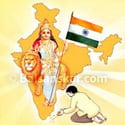Pride for one’s native language is the foundation of pride for Nation and Dharma. Today, children speak their mother tongue or native language, abundantly interspersed with words from a foreign language (Example – Hindi mixed with English).
Dear Children, if you really need to study a foreign language (For example English) when you are getting schooled, then it is all right; however, at other times why should we use English words when we are speaking in our mother tongue? Is our mother tongue or native language not rich enough? You might wonder what is wrong in using a foreign language? Do note, that our objective is not to hate a foreign language; our objective is to develop pride for our own mother tongue or native language.
Significance of the mother tongue
In which language have our Saints written ‘bhajans’? In which language did the mavalas Tanaji, Baji Prabhu etc. speak toChhatrapati Shivaji Maharaj? In which language did Swantantryaveer Savarkar (who became a Barrister in London) study when in Nasik and Pune? In the mother tongue of course! The mother tongue shapes every aspect of our life. Just as a mother provides everything to her children, so also does the mother tongue nourish our intellectual development.
Language and pride for Dharma
1. Patriotism develops due to pride for the native language : Today, when elders at home speak in the mother tongue, they casually sprinkle English words. Take the example of Maharashtra. TV and radio programs (as well as politicians, sports persons and actors) unnecessarily use English words in Marathi sentences. Using foreign words is considered to be ornate; children emulate them. This is the case in all States of Bharat.
Israeli citizens are proud of their own language : Israel is a very small country (of Jews) when compared to Bharat. When the Jews (who were scattered all over the world for 2000 years) returned to Israel after it was founded in 1948, no one had to tell them to learn Hebrew. Today, Israel is surrounded by five countries who are constantly trying to attack them. Despite this, Israelis’ pride for their language that has strengthened their patriotism.
2. Due to pride for the mother tongue or native language, culture is preserved and pride for Dharma is awakened : Just as language & patriotism are closely associated, so are language and pride for Dharma. When two people meet, they join their palms and say either ‘namaskar’ or ‘Ram-Ram’. From this conversation, you will learn to become polite or see Shriram (God) in the others. When two people (who lack pride for their native language) meet, they say ‘hello’, and as per the foreign custom, they shake hands. Does the word ‘hello’ have any meaning ? No. However, when you say ‘namaskar’ or ‘Ram Ram’ as per Hindu culture, it protects the culture and awakens pride for Dharma.
Benefits of conversing in native language
1. It is possible to fully use the natural ability to think : Children studying in the native language can think in a better manner and quickly. Their natural ability to think is not obstructed. That is why they are able to express themselves eloquently in an essay, elocution competition, get-together etc.
2. Immediate comprehension of matter : When children read story books such as the ‘Panchatantra’, ‘Hitopadesh’ etc. that impart moral values, in the native language, they can immediately comprehend the meaning and also obtain complete satisfaction from the reading.
3. It becomes easier to learn other languages : A child who is fluent in his native language can learn other languages easily.
Remembering history in the true sense !
History is not just a measure of time or a list of kings or a chronology of events. This is only the external face of history and not its true nature. To truly remember and learn from history, means to inculcate the values and virtues from the numerous great personalities and Saints that have graced history. The precedent that has been set by these great men can only be taken forward in the true sense, if we maintain pride in our native language.
Language is an invaluable heritage passed on to us
Dear Parents, explain the importance of the mother tongue from the perspective of sattvikta (Purity) to your children !
Every object is made up of three components – Sattva, Raja and Tama. Sattva waves make the mind feel pleasant and peaceful; whereas Raja and Tama waves make the mind feel distressed. Sattva waves means sattvikta. For example : When one greets another with the word ‘Namaskar’, both the people derive benefit from the use of the word due to the sattvikta of the language. Chaitanya is generated by the use of the word ‘Namaskar’ which means ‘to pay obeisance to the soul in the other’.
You have the responsibility of protecting and enhancing pride for the native language in children. Accomplish it appropriately and become ideal parents !
Reference : Sanatan’s Holy text ‘Be devoted to the Nation and Dharma’

 Children, let us put into practice the ‘Pledge’ given in our textbooks
Children, let us put into practice the ‘Pledge’ given in our textbooks Awakening patriotism through songs
Awakening patriotism through songs Youth, dont fall prey to westernized celebration of ‘Friendship Day’ !
Youth, dont fall prey to westernized celebration of ‘Friendship Day’ !